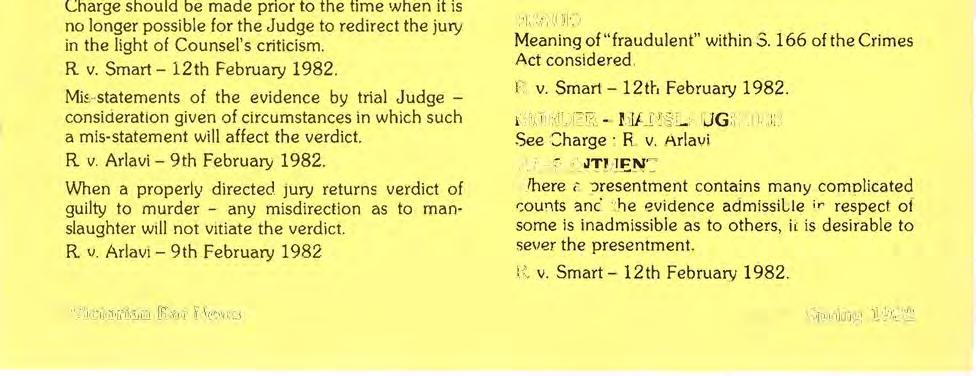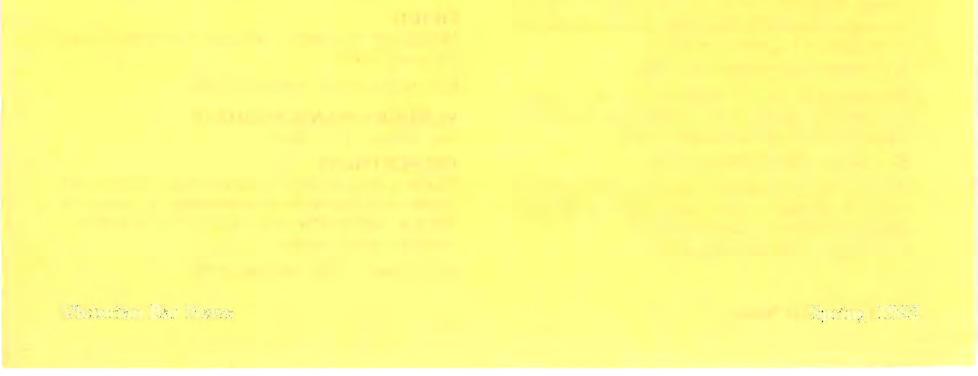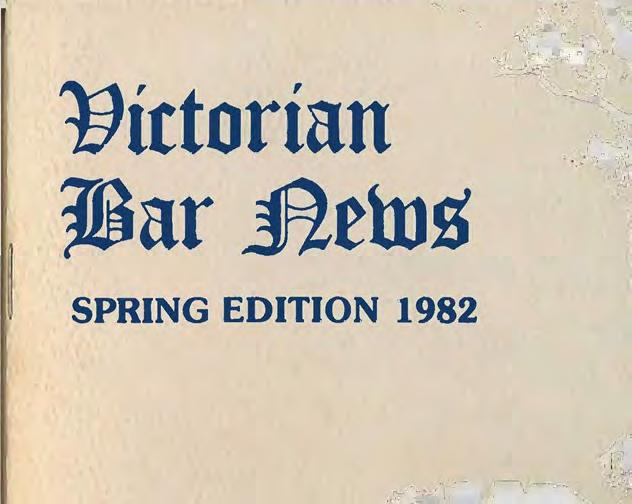




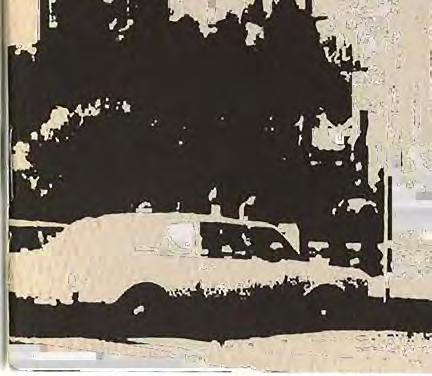















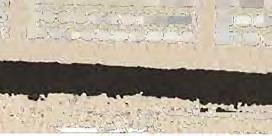

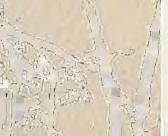
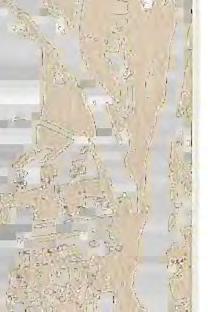


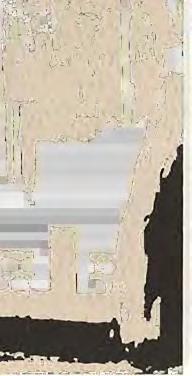






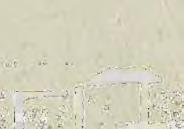



















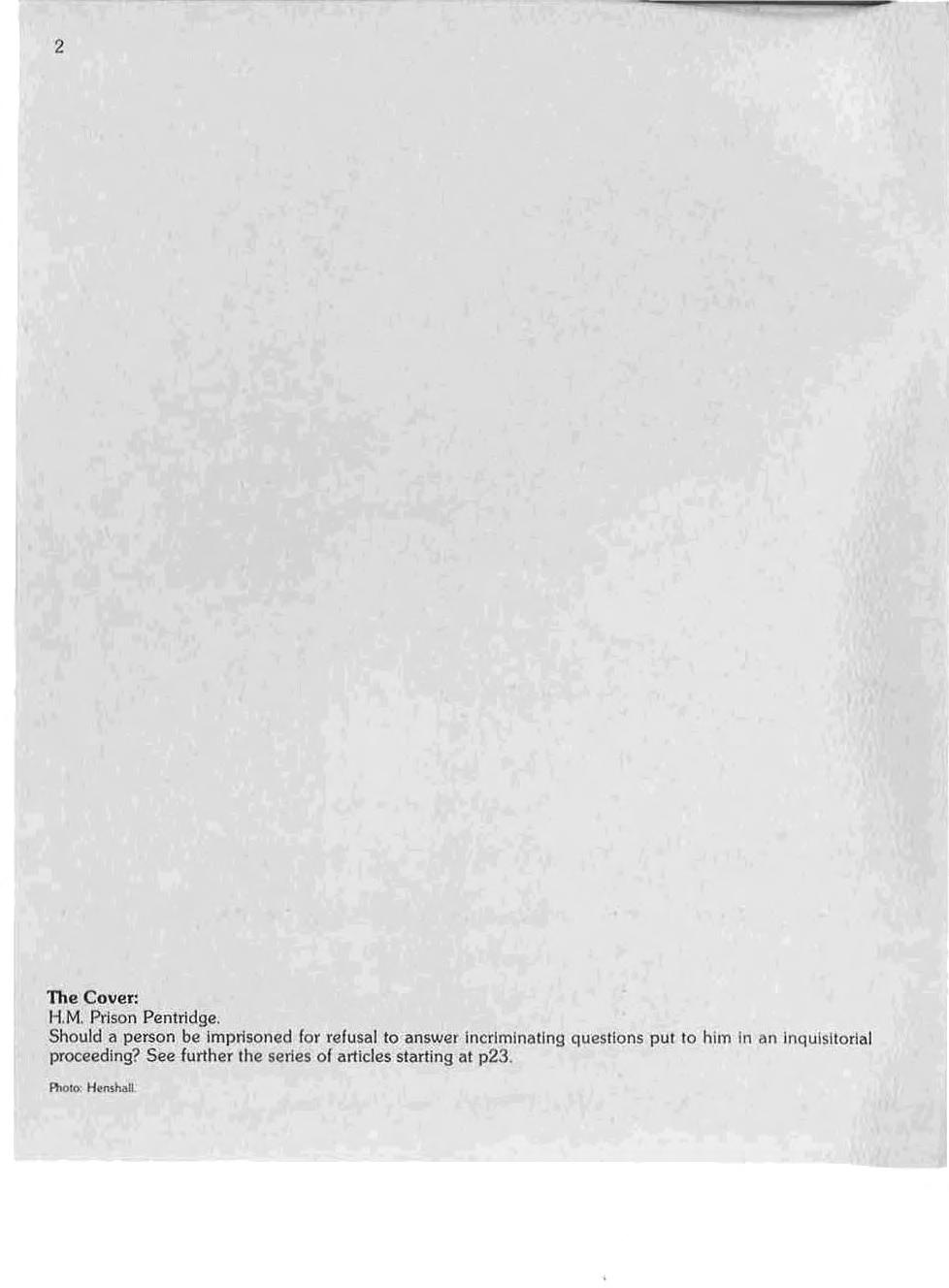









































































The following Counsel have been declared elected to office as the result of the poll which closed at 5 p.m. on 28th September, 1982.
(a) Counsel of not less than 12 years' standing (11)
J.E. Barnard Q.c.
PA Liddell Q.c.
B.J. Shaw Q.c.
J.H. Phillips Q.c.
S.P. Charles Q.c.
G. Hampel Q.c.
P.O. Cummins Q.c.
M.J.L. Dowling Q.c.
AB. Nicholson Q c.
A Chernov Q.c.
HR. Hansen
(b) Counsel of not less than 6 nor more than 15 years standing (4)
P Mandie
J.D. McArdle
BA Murphy
M.A. Adams
(c) Counsel of not more than 6 years' standing (3)
C. Gunst
R. Lewitan
M.B. Kellam


In the past year there have been 28 meetings of the Bar C o uncil and (e xc luding Waldron, Q c. and Walsh Q C appointed to the Bench , and Charles, Q c. e le c ted to replace them) the attendance figures for members of the Council are as follows:
Shaw, Q.c. Hampel, Q.c.
Barnard, Q.c.
Liddell, Q c.
J.H. Phillips, Q.c. Cummins, Q.c. Dowling , Q.c. Nicholson , Q c. Chernov , Q.c. Hansen
McArdle
B. Murphy
M.A Adams
Bannister
Rush Gunst : 26 : 26 : 24 : 22 (leave of absence for 1) : 14 (leave of absence for 1) : 25 : 22 : 19 : 21 : 22 : 27 : 19 : 21 : 10 (leave of absence for 11) : 22 : 28 Victorian Bar News
Pursuant to a request from the Chief Justice, the Bar Council has established a committee under the chairmanship of Ormiston, Q.c.; to enquire into the possibility of changes to the Supreme Court rules with respect to the exchange of medical reports in personal injury actions , interrogatories in personal injury actions, and oral interrogation
The Bar Council has decided to support the application of RA.R Lewis in his appeal to the High Court. in respect of a conviction imposed upon him for contempt of Court by a Judge of the County Court.
The Bar Library on the 5th Floor, Four Court s Chamb e rs, has been named the" Sir Edmund Herring Library ", and the Bar's portrait of the late Chief Justice will be hung there
A rep ort has been receiv ed from Peat Marwick Mitch e ll & Co., with respect to proposed changes in the Bar's administrative structure Th e BarCoun cil is in the process o f implementing many o f the recommendations contained within this report. copies of which may be inspected at the offic es of the Bar Council, For an account of the principal recommendations, see page 12
The n ew Barristers Chambers at 200 Queen Street. have been nam ed " Aickin Chambers"
AUSTRALIAN INSTITUTE OF JUDICIAL ADMINISTRATION
The Bar has appli ed for membership of the Australian Institut e of Judicial Admini stration Incorporat ed, upon the in vi tati on of M r. Justice Fo x and Mr. Justi ce McGarvie Spring 1982
The Bar Council has resolved that counsel should not accept a brief for a hearing marked "No Conference required" unless he is satisfied that for the proper presentation of the case a conference will not be required If circumstances which transpire do result in a conference being held counsel should normally charge a fee for such conference notwithstanding such an endorsement on the brief; and that the Chairman of the Bar Council discuss the matter with the President of the Law Institute of Victoria.
The propriety of Counsel giVing entrepreneurial advice, parti c ularly in ta xa tion matters, has been considered by the Bar Council. Proposed rules have been prepared by the Ethics Committee and circulated amongst the Bar The comments and submissions made in response to the circular by members have been referred back to the Ethics Committee
The Council has resolved to oppose the establishment of the proposed Crimes Commission in the folloWing terms:
"The Victorian Bar Council regards any proposal to set up a permanent Crimes Commission with compulsory inquisit or ial powers as being a grave threat to fundamental civil lib ert ies of all Australians "
The Chief Justice has appOinted as members of the Barristers' Disciplinary Tribunal the Hon Sir George Lush, Hulm e. Q c., E.D Lloyd, Q c.. Hayne and Mr Kenneth Charles Stone (on the nomination of the Attorney-General) all for a term of 2 years from 18 August, 1982
The Council has resolved to call a General M ee ting of the Bar to discuss th e question o f robes, and to re com mend to that meeting that the Bar adopt a resolution calling for the abolition of robes other than a gown
Since March 1982, the Ethics Committee held five summary hearings (one remains part heard). Three hearings resulted in a finding that disciplinary offences had been committed, as follows: -
(i) A member of Counsel had been briefed in a substantial Supreme Court action for some time but carelessly failed to note, from the list for the month, the particular Judge before whom the case was listed. Counsel assumed that the case was in the same list as that in which he held a number of briefs for that month and did not notice that this was not so. As a result, Counsel was obliged to return the brief on the morning that the case was listed for hearing. The Committee found that Counsel had committed a disciplinary offence by failing to return his brief at a reasonable time before the hearing so that the Solicitor did not have a proper opportunity of instructing some other barrister. Counsel was fined $300.
(ii) A member of Counsel was found to have committed a disciplinary offence, namely misconduct in a professional respect, in that he failed to return a brief after a hearing within a reasonable time. Counsel was fined $350. As proceedings in relation to non-payment of the fine are pending, no other details can be reported at this stage.
(iii) A member of Counsel was found to have committed a disciplinary offence, namely misconduct in a professional respect, in that he had brought the Bar into disrepute by virtue of references to the Fraud Squad in a letter to Solicitors demanding payment of overdue Counsel's fees. The Committee heard lengthy evidence as to the "debt collection" history of the matter and resolved that no further action should be taken in all the circumstances.
2. The Committee ruled that it would not be proper for a member of Counsel to sign a Certificate under Section 89A of the Transfer of Land Act 1958.
3. The Committee ruled that in relation to a barrister who contributes an article or case note to the Law Institute Journal, the barrister's name, occupation and academic qualifications may be published but not any photograph of the barrister.
4. The Committee after lengthy consideration, made recommendations to the BarCouncii as to ethical rules governing the giving of advice, including tax advice. These recommendations have been circulated by the Bar Council to members of the Bar. The Committee has since considered the matter of assignment of Barristers' debts and made certain recommendations to the Bar Council.
As part of the Centenary celebrations for the Bar in 1984 it has been decided by the Centenary Committee to produce a theatrical revue At this stage, the Producers call on all members of the Bar who are interested, to submit for consideration script material of a comical and satirical nature.
The Producers request that any material submitted be -
(1) typewritten;
(2) have attached thereto the source of the material if unoriginal;
(3) include the name and clerk of the Barrister submitting the same.
Please submit such material to G .P. Thompson, (C/Foley) without delay. Victorian Bar News
Lawyers are becoming very unpleasant people to be with, especially if you are another lawyer. A disturbing number of them apparently believe that the way to deal with opposing counsel is to be impolite,intemperate, and insulting. The practical effect is that no matter how correct a lawyer's position may be, it is bound to be undermined if it is presented in a way that antagonizes everyone.
This tendency towards contentiousness should be recognized and stopped. For some, any effort to be polite - much less friendly - with an adversary will cause the grinding of teeth. Far too many lawyers seem to believe that once they donned the "attorneyat-law" mantle, they doffed what remnants of common decency had not been stripped from them by three years of law school.
The cornerstone of our legal system is the adversary process - that quest by a lawyer on one side of an issue to test and try all factual or legal points raised by the lawyer on the other side. Conflict is the name of the game. The art of conflict is taught in law school , along with the mechanical tools needed to engage effectively in that conflict. little or no attention , however, is given to teaching the ambitious law student how to balance the use of his advocacy skills with those fundamental notions of fair play and politeness that make life and the practice of law so much more pleasant. When one has finished law school and is immersed in the high stakes practice of law, the righteously indignant demeanor becomes more easily affected than simple common decency.
Young Lawyers observe and take their cues from more experienced members of the bar. Not long ago , I was introduced to a young criminal lawyer Within five minutes , he had convinced me that he was doing his utmost to be as unpleasant as possible in what should have been a most informal encounter. A few days later I mentioned this to the senior partner in his law firm, who fairly glowed with pride as he said, "That's the way I train them."
In criminal litigation defense lawyers generally can be divided into two categories. In the first are the lawyers who approach a prosecutor and a judge with a practical , professional, firm, but polite demeanor. In the second are those who routinely accuse the prosecutor of being dishonest, unethical, and devious.
Spring 1982
While the latter approach might convince a client of how forcefully his case is being handled, the practical effect is to stiffen the prosecutor's attitude. The sins of the attorney are inexorably visited upon the client. This is even more counter-productive when it is the judge who has been so treated. It is common knowledge among prosecutors that some defense lawyers, who may amaze and impress their clients with their verbal antics , often cause the imposition of a harsher sentence than would otherwise have been the case
It is the lawyer who can maintain cordial relationships with opposing counsel, without yielding an inch on any legal or factual argument, who most often walks away with the best results for his client. The lawyer's future clients benefit as well because of the reputation that lawyer invariably enjoys. I am not suggesting that vigorous advocacy is inappropriate. What I am suggesting is that in the course of one's practice , there is no reason why , in disagreeing with an opponent , one need be disagreeable.
An attorney who becomes angry in the heat of battle is only human; an attorney who makes a premeditated decision to attack his opponent in an unprofessional and dehumanizing way cheapens the level of advocacy and degrades both himself and the profession
Perhaps our concept of legal ethics needs to be broadened to proscribe this type of fashionable bitchiness. Is it too much to ask that lawyers be polite? If it is , then perhaps it is time for a hard look at a legal system that makes civility archaic
The willingness to insult and be disagreeable is not only inconsistent with respect for the dignity of the law. it is also inconsistent with a respect for the dignity of one ' s opponents. A modicum of politeness will do more than merely benefit one's client or upgrade the level of practice of law . It also will make lawyers more pleasant to be around.
-w.B. LYTTON

(Mr. Lytton is first assbtant United States attorney District of Pennsylvania (Philadelphia) , Of course, the comments own and do not represent the position of the Justice Department)
(Reprinted with permi ssi on from the American Bar Association Journal.)
The appointment of Daryl Michael Dawson to the High Court of Australia has been greeted with acclamation by all members of the legal profession. The appointment is the culmination of an extremely active and distinguished career in the law.
Daryl Dawson was born on the 12th December 1933, graduated from the University of Melbourne with an honours degree in law in 1954 and obtained the degree of Master of Laws from Yale University in 1956. He signed the Roll of Counsel on the 28th November 1957 and read with Murray , thereby establishing a line of succession to the position of Solicitor General for the State of Victoria, now viewed with interest by his many readers
Daryl Dawson qUickly established a very busy practice in the commercial, industrial and constitutional spheres, having chambers on the 8th floor of Owen Dixon Chambers which included such luminaries as Starke, Woodward, Gobbo, Storey, O'Bryan, Read, Tolhurst and, more topically, Costigan.
Daryl Dawson had a cricket team of readers Streeter, Wraith, Granat, Hansen, Strachan, Chemov, Goldberg, Schofield, Hawkins, Walls and Gibson.
He took silk in November 1971 and was appointed Solicitor-General in August 1974 . His contribution to the law was recognised in 1980 when he was created a Companion of the Order of the Bath. In more recent times, Daryl Dawson has been known for his fairly constant attendance before the High Court of Australia in which he has been acknowledged
as an outstanding advocate and probably the most outstanding Solicitor-General to appear before the High Court for many years. He has appeared in most, if not all, of the leading constitutional cases over the past ten years and has led not only for the State of Victoria, but also for other States. His style of advocacy has been recognised and accepted as a model to be followed in the appellate jurisdiction
His interests and involvement in legal education extended over many years through Ormond College and the course for articled clerks administered by the Royal Melbourne Institute of Technology in which he was a foundation lecturer.
Daryl Dawson's activities and interests extended beyond the law. He was from time to time assisted in his sheep mustering by a well-known County Court Judge complete with homburg and three-piece suit. Furthermore, he attended the Oasis Gymnasium for many years where his feats at body building were regarded as much more significant than his undoubted (and in that milieu, unrecognised) legal talents.
Another association which is perhaps Jess well known was his participation in CAMS , the Confederation of Australian Motor Sport, where he was able to use his knowledge of the modifications which could bring out the best in a motor car. For many years, he has occupied the position of puisne judge on the Australian Motor Sport Appeal Court of which the "Chief Justice" has been Mr. H.G. Lander.
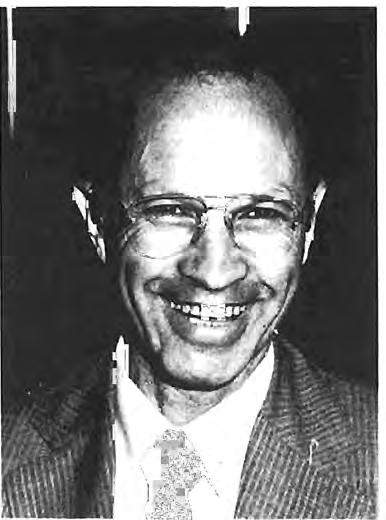
Hartog Berkeley has been appointed SolicitorGeneral of the State of Victoria _ He brings to this position many qualities other than those of an outstanding lawyeL He has within him a wealth of experiences gained outside the courts and outside the law Most important. he is a man of humour. fairness and courage . He was born in London. the eldest son of a Dutch bookselieL He attended Eltham College. Kent and thereafter London University. where he studied Arts and Economics for two years These studies were interrupted when the whole family came to Australia in 1947 and settled in New South Wales _ His love for the country combined with the persuasiveness of a young lady made him an instant success as a sheep rousabout on her father's property _ This success was repeated over the next few years on other farms . Thereafter he and his brother began an interstate trucking business From trucks to concrete. and then to clothing. and. at the age of 25 Berkeley was ready for marriage membership of the New South Wales Scottish Regiment and. a year later. the study of law.
1982

He joined the New South Wales Bar at the age of 30 and read in the Chambers of T.E Hugh es He was to continue reading for some time _ For the first six months at the Sydney Bar he did not receive any briefs and. at the persuasion of Vernon (a fellow member of the New South Wales Scottish Regiment) he came to Melbourne to sign the Victorian Bar Roll on th 1st June 1959 _ His reading continued. this time with W 0 Harris Selborne Chambers In due course. together with Nash and Elaine Kiddie he set up Chambers in Little Bourke Street known as Condon Chambers where he practised until the establishment of Owen Dixon Chambers _

His efforts as Lecturer in Commercial Law at Monash University soon bore fruit He quickly developed a large commercial practice. specialising in taxation . He educated four readers. Moshinsky Bayliss Golombek and Foley
He took silk on the 8th November 1972 He was a member of the Bar Council and served on many committes _ He was Vice-Chairman and in turn Chairman of the Bar Council from 1979 to 198L
He derives much enjoyment from his farm on the Rubicon River. long distance running. mountaineering and the company of the family dog Phoebe who often accompanies him to Chambers No doubt the habit will continue and require some adjustment on the part of the "shadow" Attorney-General and Crown Counsel when they hear shouts of "heel".
The success of the Essoign Club is largely due to his endeavour and we hope that he continues to frequent it. The Bar welcomes his appointment and wishes him success and satisfaction in his new office .
•
In May 1982 the Bar Council resolved to review the administrative, organisational and financial structures of the Bar. On 1st June, 1982 Chairman of the Bar Council and the Chairman of Directors of Barristers Chambers Ltd. appointed PGat Marwick, Mitchell Services to review those structures and report on them.
In June 1982 Mr. David Crawford, a partner of Peat Marwick, Mitchell & Co. and Mr. Philip Bowman an employee of that firm met with members of the Bar Council and the Board of the Company, interviewed staff members and generally looked into the working of the whole administrative system of the Bar. Their report was delivered on 23rd June, 1982 and presented at a meeting of the Bar Council on 24th June, 1982 which was attended by Mr. Crawford who addressed the Council and answered questions concerning his report. On 28th June, 1982 the Bar Council resolved subject to the views of the Board of Barristers Chambers Ltd., that the report be implemented and a committee was appointed for that purpose. On 22nd July, 1982 the Chairman and Directors of the Company attended the Bar Council meeting to discuss the report. It was then resolved to request the administration committee consisting of the Chairman, the Vice Chairman, the Honorary Treasurer, the Chairman of Directors of the Company to commence its work to implement the report.
The principal recommendations of the report are summarised as follows:
1. The Board of Barristers Chambers Ltd. should be reduced in number and constituted as a subcommittee of the Bar Council, the members of which may not be on the Bar Council but coopted to serve on the basis of commercial experience.
2. An administration manager should be appOinted with day to day responsibility for the administration and financial requirements of both Barristers Chambers Ltd. and the Victorian Bar. As a result of this appointment, duties allocated to existing personnel could be rationalised including the appointment of the Executive Officer of the Victorian Bar as personal assistant to the Chairman of the Bar Council.
3. Regular financial reports should be prepared for both Victorian Bar and Barristers Chambers Ltd Such reports, prepared monthly, should include actual trading results compared with those budgeted as well as a balance sheet.
4. A long term strategy of the Victorian Bar should be developed and documented in a rolling five year plan. The first year of such a plan should proVide a detailed financial operating budget.
5. An inhouse mini computer should be purchased and software deve lo p ed to rep lace t h e existing manual sys tem used to record r e nt als, unsecured notes and debentu res A by· prod uct o f t h is wil l be the automatice mainte na nce of the Bar Roll and other listings as well as the printing of interest cheques and periodical payment authorities. The computerisation of the remaining accounting operations should be considered once these initial systems have been found to run satisfactorily.
6. A Project Manager should be appointed to supervise the development of the AB.C. site if it is decided to proceed with this rather than purchase an existing building.
7 The discussion of business at Bar Council meetings should be limited to matters contained in discussion papers circulated prior to meetings or items on the Agenda.
8. Consideration should be given to transferring responsibility for the investments of the superannuation fund and the recording of its transactions to an outside firm of fund managers.
9. The existing debentures and unsecured notes on issue should be consolidated into one type of debt with simplified instalment payment and interest eligibility provisions.
10. The financial year end of the Victorian Bar should be moved to 30th June so that it is coterminous with that of Barristers Chambers Ltd ..
11. An index of the minutes of Bar Council Meetings should be prepared and updated on a regular basis.
12. Information requested by applicants seeking to sign the Bar Roll should be provided in a standard booklet supported by orientation seminars
13 . The accounts prepared by the caterers of the Essoign Club Ltd. should be audited prior to the payment of any subsidy by Barristers Chambers Ltd
14. A professional valuation of Owen Dixon Chambers should be obtained and the resultant gain on revaluation reflected in the accounts for the year ended 30th June, 1982. Such a revaluation will assist Barristers Chambers Ltd. in negotiating future loans to cover its financial requirements.
15. A uniform retirement policy should be adopted and be applicable to all employees of Barristers Chambers Ltd and the Victorian Bar at the age which they become entitled to receive Social SelVice benefits, but subject to transitional arrangements for existing staff who have currently passed that age.
16 . Additional office space will need to be acquired adjacent to the existing administration offices on the 12th fioorto house the new appointments and consideration be given to providing permanent Chambers (adjacent to the existing administration) for the Chairman of the Bar Council from time to time.
The Administration Committee has met on a number of occasions and has resolved to seek out a suitable person to perform the duties of Executive Director of the company. A job specification has been drawn and it is expected that the selVices of Peat, Marwick,
BARRISTERS' CHAMBERS LTD.
Being a sub-committee of the Bar Council consisting of:-
The Vice-Chairman as Chairman of Directors : The Hon Treasurer: The Chairman of the Accommodation Committee: The Executive Director: 1 other nominee of the Bar Council. Secretary BCl (Accountant) Spring 1982 Receptionist Typist
Mitchell & Co. will be engaged to find an appropriate employee This is a new position and in essence is that recommended in the report as Administration Manager. The Administration Committee has thought it appropriate to have the new appointee as a fulltime executive member of the Board of the company. It is thought that this will assist to reduce the present heavy demands on the time and efforts of the directors.
Consideration is being given to the reconstruction of the Board of Barristers Chambers Ltd. which would then consist of:
Vice-Chairman of the Bar Council as Chairman of Directors; Honorary Treasurer; Chairman of Accommodation Committee; Executive Director; One other nominee of the Bar Council. The administrative structure of the Bar Council and the company would then be amended to achieve the result depicted in the diagram below. The result will be that there is direct responsibility of the Executive Director to the Bar Council (and its executive committee) and likewise the Board of the company. The Executive Director to whom all other staff will be directly responsible will have direct access to the Chairman of the Bar Council for the day to day running of the Bar as a whole. All existing staff will be retained but to some extent there will be a rationalisation of roles with a view to having the affairs of the Bar Council and the company administered as one structure rather than separately as present. It is hoped to introduce the new structure within the next 12 months
J.P. Court of last resort.
Jactitation. A prophylactic matrimonial cause.
Jail. The tycoon's alternative to a knighthood.
Jeofails. The original plea in confession and avoidance.
Jeopardy. The condition of counsel seeking an adjournment in the County Court.
Jetsam. The argument for the Respondent on an application for special leave to appeal to the High Court
Joinder. A method of multiplying refreshers
Joint Liability. The penalty for being found in possession of another's reefers
Jointure. Post-mortem maintenance.
Journeyman. Junior Counsel on circuit.
Judge. An advocate who has been advanced to the status in which he is presumed to know what the law is This should enable him to pass undeterred the ghosts of the past clanking their mediaeval chains. (1941) A.c. 1, 29 but see "Jurist".
Judge, Advocate. Indeed!
Judge's Rules. The forms of procedure contained in the Associates Handbook. (as opposed to Masters Rules which are ineffable)
Judicial Combat. A dissenting judgment with reasons.
Judicial Discretion. A softer word for arbitrariness. R v Walcott (1694) 4 Mod 395
Judicial Method. It is not always necessary to emulate Mr. Justice Harding who as he lay on his couch in his chambers greatly weakened and failing fast, summed up to the jury in Kinivan v Holland, (1921) Q.P.D. 1002
Judicial Notice. The rule of law which holds that the obvious is obvious, e.g. that adultery cannot take place on the front seat of a lorry (at first instance) or as the Lord Justices of Appeal thought obvious, that adultery can take place on the front seat of a lorry. Yuill v. Yuill (1945) 1 A.E.R. 183, 186.
Judicial Separation. A judgement of Solomon.
Victorian Bar News
Junior Counsel. The class of counsel who may not be briefed to appear with senior counsel unless already briefed to appear elsewhere with other senior counsel.
Jurisprudence. The substitution of logic for common sense
Juristic Act. A final address to a criminal jury.
Juristic Person. A creature of law created with powers and will but without feelings, e.g. a Crown Prosecutor.
Jurist. The timorous soul fearful of allowing a new cause of action , (1951) 2 K.B 164, 178
Jury. The tribunal in which twelve or six persons of either or indeterminate sex are made equal to one reasonable man
Just And Equitable. The Chancellor' s well· meaning sloppiness of thought. Justice. What the undeserving Plaintiff asks for and dislikes when he gets ,
Justifiable Homicide. The retribution exacted upon a barrister who after the compromise of an action tells his oppenent what his true instructions were.
Juverna. ???
"You know . Whitehead, when barristers wore wigs I wore one that belonged to Smyth . c.A. Smyth ," said the judge. He leaned back into the club chair trying to relax after a trying day of dividing children of no apparent charms between parents who had obviously passed on that frailty . " Smyth" , said his judicial colleague " Wasn ' t he the prosecutor in the Ned Kelly trial before old Red Bany.?"
" The same. God knows what his robes would look like if they survived . But the wig, when it got to me, was held together by gum arabic and generations of macassar." His eyes glazed over. The nostalgia and the brandy were taking their toll. "They didn't know what they were starting, that bolshy Bar Council . . " He fumed silently now
Spring 1982
The abolition of wigs and robes affects the Bar as well though," said the other. "My eldest boy had his first criminal trial the other day . He had a terrible time . First they refused to let him into the cells to see his client. When at last he got in , they wouldn't let him out. Th e n the tipstaff said he couldn't go to the Bar table because it was reserved for barristers . And if that weren't enough, when the Judge came on to the bench , he asked him if he were an applicant in person! "
The piped music changed to a new theme and Joni Mitchell sang. " Don't it always seem to go That you don't know what you've got 'til it's gone "
"Studies in other countries have shown that the intuitive beliefs of lawyers as to what should be done to improve the administration of the Courts are by no means reliable. I do not think this is surprising for, speaking very generally, lawyers are not administrators. A lawyer's training does not generally fit him to be an administrator or teach him to look at the whole operation of the Courts. His training has always taught him to concentrate upon the case in hand to the exclusion of all else An administrator on the other hand, concemed with the overall operation of the system, is not interested in the outcome of any particular case. He is more interested in the rate at which the Court disposes of its cases whether by settlement or adjudication. He is more concerned to know whether the judicial resources are being efficiently utilized than whether a case has been correctly decided. In other words, he will ask, are the taxpayers and the parties, who together pay for the luxury of litigation, getting value for their money?"
These comments by Sir John Young, Chief Justice of Victoria, highlighted the theme of the Inaugural Seminar of the Australian Institute of Judicial Administration held at Sydney University on 14th August 1982.
The Chief Justice of the High Court, Sir Harry Gibbs, formally opened the Seminar and the Chief Justices of New South Wales, Queensland and Tasmania were also present. The total attendance was 174, which included participants from Darwin, Perth and Hobart.
Speakers at the Seminar stressed the development of judicial administration as a subject for intensive research with the aid of modern scientific methodology. In the words of Dr. Ross Cranston, who will be
heading the Institute's first research project into delays in the Supreme Courts of New South Wales, Victoria and the A.c.T. :
"Too often in the past particular organizational and procedural changes have been introduced on the basis of hunch without a thorough examination of their feasibility "
The proposals for reform which have been made throughout the common law world are varied _ They include -
(a) resources - more judges and more staff;
(b) procedural reform - special procedures for, say, personal injuries cases, modification or abolition of pleadings, discovery and interrogatories, full disclosure of evidence to the opposing party;
(c) court control - "plaintiff to report" system, pre-trial hearings and settlement conferences;
(d) institutional change -" pushing down" matters from superior to lower courts or court officers or to court appointed arbitration, greater use of written argument or, at a more general level, a move away from the adversary system;
(e) substantive law changes such as a national accident compensation scheme; improved professional education to overcome delay for which the profession is responsible.
Dr. Cranston pointed out that most of these reforms have been tried in at least one common law country. Some have been shown by research to have had an impact, sometimes a significant impact on delay Howeverno one particular change has been identified as being the key factor in redUCing delay and, in Dr. Cranston's words, "Those which have been confidently asserted as crucial have sometimes produced few results".
Victorian Bar News
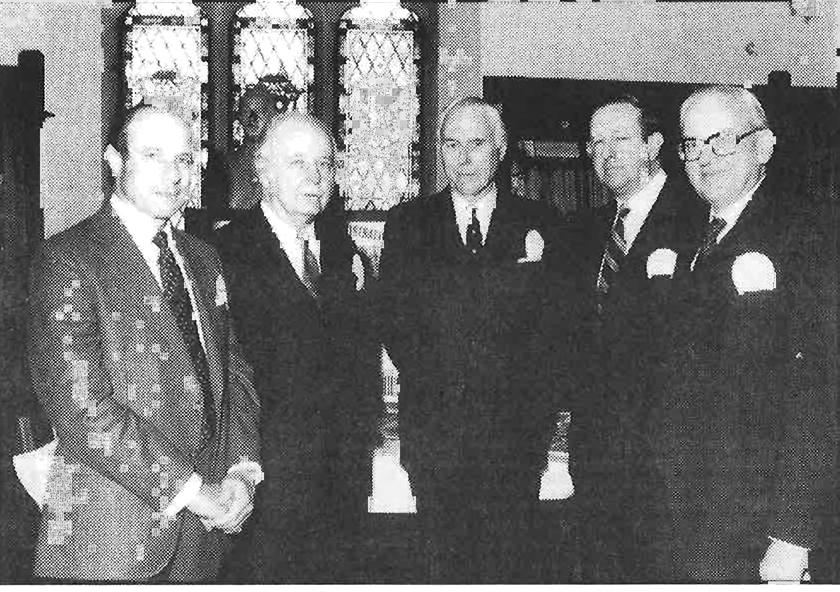
The Institute will be able to support research which will make major headway in improving the efficiency of the Court system in Australia Such a move is not before time , Not only does Australia lag behind other common law countries in this area, but in any event overseas research and conclusions are necessarily of incomplete validity because each legal system is influenced by local conditions, not least of which is the phenomenon known as the "local legal culture". The Institute will be active in other areas of judicial administration Two other projects have also been set in train. One of these is " The Efficient Listing of Cases for Hearing" which is being examined by a committee under the chairmanship of Mr. Justice Helsham, Chief Judge in Equity in New South Wales. Another project which has commenced under the chairmanship of Sir Guy Green, Chief Just ice of
Spring 1982
Tasmania is "Ensuring the Independence and Reasonable Autonomy of the Judiciary". These projects are being carried out by voluntary committees on an honorary basis . It is hoped also that the Institute can make a contribution to the achievement of a far-sighted objective referred to at the Seminar by Sir Laurence Street, Chief Justice of New South Wales -a restructured and integrated Australian judicial system to be operative by 1988 as a mark of the 200th anniversary of the founding of our nation
The Institute would welcome application for membership by members of the Bar who support the work of the Institute. The annual subscription is $25 Further information can be obtained from the writer.
In 1978 S.7 of the Magistrates Courts Act 1971 was amended so as to specify the qualifications for appointment to the Magistrates' Bench. Previously the Act was silent as to such qualifications, and eligibility for appointment was hidden away in Regulation 28 of the Public Service Regulations. It was anticipated that the 1978 amendment heralded some significant changes in appointments. Alas, the years passed and no changes occurred. The reason it appears, is that no regulations pursuant to S. 7 (3), were made or were being made. Those regulations were required in order to satisfy the requirement of prescribed age and and experience referred to in S. 7(IA). The delay in making these regulations may have arisen from pressure applied by the Clerks of Courts Association, whose members feared that appointments from their ranks would be reduced. Indeed, all that the 1978 amendment does is to widen the pool of persons eligible for appointment so as to include legal practitioners, and persons with law degrees. Clerks of Courts will still be eligible, and the grandfather clause in S. 7 (IA) (a) (iii) continues their eligibility. Of course they will have to compete with other persons now also eligible for appointment. The long awaited regulations were made by Statutory Rule 463 of 1981 which came into effect in October 1981. The prescribed experience for legal practitioners is- "not less than five years practice as a barrister and solicitor in Victoria and substantial experience
in the practices and procedures of Magistrates Courts in both Civil and Criminal jurisdictions." The prescribed age is 35 years, as before. Salary SM-l $45,077.
Since the regulations came into effect a number of Stipendiary Magistrates' positions have been filled . In each case, until recently they were filled by Clerks of Courts, or former Clerks of Courts then working as Legal Officers in the Government service. The reason that no non-Government practitioners were appointed was simply that the positions were advertised for appointment from within the Public Service only, and consequently no non-Public Servants were eligible to apply.
Among the three most recent appointments to the Bench is the Director of Policy and Research in the Crown Law Department, Graeme Golden. Mr. Golden's appointment is significant in that he has never been a Clerk of Courts. He is in fact the first person to be appointed to that bench from outside the ranks of the Clerks of Courts, or former Clerks of Courts.
It seems to be the policy of the Cain Government to select Magistrates from all areas of the profession, and it appears that we can look forward with confidence to future appointments from the Bar, from Solicitors and from Government employed Legal Officers. In his opening of the recent Magistrates' Conference the Premier foreshadowed some significant changes within that jurisdiction, which the Bar will no doubt await with interest.
Deaths:
On 13th May, R.W. (Bob) Smith, SM
On 20th May, Kevin McDonald, SM 1956 - 1959
Retirements :
Ron Brown, SM at Ringwood for 14 years Les Ross , SM from 1962 Kevin Hudspeth, SM from 1961
Appointments:
Ian von Einem, LL.B. lately of Legal Aid Committee and Environment Protection Authority.
Doug Bolster, LLB, lately of Housing Commission Royal Commission and Environment Protection Authority.
Frank Hodgens, LLB, lately Coordinator at the City Court.
Graeme Golden, LL.M., lately Director of Policy and Research, Law Department.
John Hutchins, LLB, lately Clerk of Courts at Morwell.
Frank Moloney, LLB, lately Clerk of Courts at the Childrens' Court.
A recent conference of Victorian Magistrates has decided to accept a 1980 decision of Mr. B. Clothier, S.M. in relation to the entitlement of legal services to party/party costs. Mr Clothier decided that a litigant represented by a university legal service was entitled to be awarded party/party costs follOwing a successful civil action in a Magistrates' Court.
There has previously been some disagreement among Magistrates as to whether on the question of costs a party represented by a legal service ought to be treated in the same way as one represented by a private practitioner.
The Magistrates' Conference discussed the issue and decided unanimously that there ought to be no discrimination of this sort against legal services.
Spring 1982
You may be a complete and utter Purist, Tune to nothing but the good old A.B.c., But if you ever tum to other channels, Are you maddened by the adverts, just like me?
The bragging supermarkets with their "specials" , Car salesmen urging us to "underpay"; And if we took advantage of these bargains, We'd save a heap of dollars every day.
Now there's nothing wrong with healthy competition, It's carried on in countries near and far.
And being of a thoughtful disposition, I pondered - why not discounts at the Bar?
There are lawyers who write memos by the dozen, With sets of interrogs' most every day, And for all these words of pure unquestioned wisdom, The sollies and their clients gladly pay.
So advertise, this week a "Bumper Offer", Affidavits in support for just half price, Opinions, ten bucks off, for two days only, And the brief will be returned in just a trice . A special price for bulk is most important, For twenty briefs or more it makes good sense, And as a little extra-plus incentive, You could make it known you'll draw a free Defence. But what of those whose practice isn't paper, And whose workplace is exclusively the Court? Of course you can create some competition With discounts of a rather different sort.
You'll see the possibilities are endless, How you operate is really up to you:
Discreetly tell your clerk to pass the whisper, You'll work three days and charge for only two So try and gain some fame and recognition, A double page, perhaps, in Monday's Sun.
To advertise your weekly "Pink Tape Specials", Let's face it, why should Coles have all the fun?
Susan Morris
'Red Centre' - what magical images do these words conjure up in your minds?
For me they bring back memories of Saturday afternoon matinees in the Regal Theatre and the cheap brand of strawberry-centred chocolates with which I tried to inveigle 'favours' from my adolescent female companions. (I often wonder if my constant failure was because the chocolates aggravated my pimples )
For you Victorians beset by your Falkland-type climate, 'Red Centre' no doubt propels the mind, with the desperate speed of a Tourist bus, to 'a Town like Alice'.
Eventually , in the fullness of some financial year, a tax deductible Law Conference will be held in the Northern Territory Why not in Alice Springs a town which may be politically designated "the brightest stud in the Country Party hardhat".
What follows is a background briefing so that you may obtain the maximum benefit from such a conference. If it is inadequate, merely regard it as you would a Magistrates Court brief from your average suburban solicitor .
The leading N.T. politician is affectionately known to his supporters as Porky Everingham. Some may describe him as the poor man's Piggy Muldoon. Interestingly, this porcine theme is taken up in the realm of commerce, with a leading local supermarket rejoicing under the name of 'Piggly Wigglys' It this nomenclature engenders a morbid fear of swine fever, you can always change species and shop at a rival supermarket called ' Egar Beavers' Ufe in this Centre of bull and red dust can be one of great privation. For example there are no morning newspapers Thus you are forced to face your spouse across the breakfast table .
Food prices are so high that inflation has yet to catch them up. The best way to survive is to come well prepared. Set out with a really well stocked wallet. Beer easily surpasses Tomato Sauce as the major beverage. It is not sold by brand name but by the colour of the can . Therefore if you want a Fosters you request a blue can. If your taste runs to Victoria Bitter you order a green can. Can you follow the system? You are definitely Northern Territory Cabinet material.
Recently the Best Brains in the N.T. Tourist Commission issued the snappy slogan - "Tell a Tourist where to go!" It is rumoured that the local popularity of this directive has led the Government to contemplate similar inspired phrases for other instrumentalities Thus for the Railways - "Tell a passenger where to get off!" And for the Post Office - "Tell a customer where to stick it!"
Territory Towns such as Tennant Creek are also jumping on the bandwagon. Some local muse produced the catchphrase "Stay a Day in Tennant Creek" . Unfortunately, this seemingly moderate injunction involves a wildly optimistic assessment of the town's attractions.
Rnally, I must inform you of the time difference between the N.T. and the Eastern States. You will need to retard your watches . If you wish to do this accurately it is preferable to purchase a timepiece which indicates dates. Don't forget to set it at 1950.
The scenery in Central Australia is magnificent - as yet the N.T. Government hasn ' t managed to destroy it. Of course it is difficult to dam the Todd River for hydo-electric power.
If you start organizing your Law Conference today, it won't be too long before you're avoiding tax in this little Redneck of the woods
ACROSS:
1. Counsel's private offices (8)
5 To allege in pleading (4)
9. Lustful man (5)
10. President of Roman province (7)
11. Puts written question to another party (12)
13. Resurrection festival (6)
14 Unseverable contract (6)
17. A court's power (12)
20. Abrupt in manner (7)
21. Escape tax payment (5)
22. Bonds (4)
23. Persons holding property on trust (8)
DOWN
1. A suit for trial (4)
2. Turns the mind to (7)
3. New Solicitor General with gongs (8,1,1,1,1)
4. Published account of legal proceeding (6)
6. Come to see (5)
7. Made opposition to (8)
8. Arboreal gallows (7,5)
12. Fresh frill for the barrister's neck (3,5)
15. Place apart (7)
16. In line (6)
18. Stendhal et noir (5)
19. Barrister's income (4) SOLUTION PAGE 42















Royal Commissions and Boards of Inquiry have been appointed with remarkable frequency in Australia , by both State and Commonwealth Governments The recent spate of such Commissions and Boards, and the publicity attendant upon their proceedings, is an occasion for some reflection upon the procedures of such bodies and their effect upon the rights and privileges of witnesses as traditionally perceived.
The common law accepts the existence of a privilege against self-incrimination which is available to any witness giving evidence and which will prevail unless taken away by statute. The privilege has been given statutory form in most Australian States: Cross on Euidence, 2nd Aust. Ed., § 11.7 The privilege has however been confined to privilege against " testimonial compulsion": Wigmore on Euidence, Rev. Ed , §2263.
In Australia we are accustomed to the exercise of statutory powers by Commissions and Boards to take evidence on oath and to compel the attendance of witnesses and the production of documents It is from the existence of those powers that the threat to traditional privileges arises. Yet those powers are, to a large extent peculiar to Australian Commiss ions and Boards They have their origins in the Victorian Commissions of Inquiry Statute 1854 That Act was
Spring 1982
passed to enable an inquiry to be held into the "Eureka " uprising and conferred compulsory powers upon a committee of inquiry . It was a temporary measure , expiring after 12 months, but for no apparent reason the compulsory powers re-surfaced in the consolidating Euidence Statute 1864 and remain to this day: Euidence Act 1958 ss. 14-20
They have been adopted in all other Australian jurisdictions. By contrast , in the United Kingdom, inquiries do not possess such powers by virtue of their creation or appointment and they must be specially conferred, either by statute or Parliamentary resolution pursuant to statute
In Australia the legislatures have adopted the technique of rendering witnesses before Commissions and Boards compellable notwithstanding that their answers might tend to incriminate, and of providing, as a limited safeguard, that incriminating evidence elicited under compulsion is not admissible in any proceedings, civil or criminal, against the witness , other than proceedings for perjury arising out of the untruthfulness of the evidence given: Victorian Euidence Act 1958 s. 30; Commonwealth Royal Commissions Act 1902-1973 s. 600.
This peculiarly Australian form of inquisition is open to a number of objections. First, it produces the
spectacle of a person compelled by the force of legal process to give evidence of an incriminating character against himself, contrary to the fundamental and cherished traditions of the common law. Secondly the publication of the evidence so elicited and the publicity attendant upon the occasion of its being given may prejudice the fair trial of the witness even though the evidence itself cannot be adduced at the trial. Thirdly, the requirement that the witness should be pinned down on oath to a particular account or explanation of events or circumstances will severely curtail the conduct of his defence to any charge arising out of those events and circumstances.
Apart from the exclUSionary provisions in the statutes themselves there are few limitations on the powers of Commissions and Boards which afford much protection to a witness, although a recent High Court decision may have produced a significant advance in this area. The most important limitation appears to arise from the rule that a Commission or Board may not do any act which amounts to an inter· ference with the course of justice, the fact that the Commission or Board is acting for the Crown providing no excuse: Clough v. Leahy (1904), 2 c.L.R. 139, 161; State of Victoria v. B.L.E (1982) 56 ALJR 506. This means that, if the conduct of the proceedings of the Commission or Board or the presentation of its report is likely to interfere with the due admin· istration of justice, a contempt of court will be committed. One difficulty about this limitation is that its utility depends upon either the discretion of the Commission or Board in the conduct of its own proceedings or the willingness of a court of competent jurisdiction to intervene. The existence of the limitation would not itself afford the witness a ground for refUSing to answer questions. Another weakness of this limitation is that it only operates while court proceedings are pending, and is not available where the apprehended interference with the course of justice cannot be shown to be likely.
In conclUSion, reference should be made to the decision of the High Court in Hammond v. Victoria and the Commonwealth (unreported, High Court, 6.8.82). For those with a sense of occasion this was something to remember. The members of the Court each gave their separate reasons for judgment orally in the No. 1 Court in Canberra after reserving judgment the previous day. The Court has rarely adopted this procedure in recent years The reasons for judgment are not yet available in writing and the follOWing rests upon the recollection of the writer.
Hammond was a witness in the Meat InqUiry before Woodward J. At a stage when he had been charged with offences arising out of the events and circum· stances which were the subject of investigation by that Inquiry, and had been committed for trial in the County Court upon charges for those offences, Hammond was summoned to appear to give further evidence at the concluding stages of the Inquiry, the intention being that he should be examined about matters which were the subject of the pending charges. The members of the Court were all of the opinion that the examination should not proceed having regard to the likely prejudice to the trial of Hammond before the County Court, but, by a majority, an order restraining the presentation of a report by the Commission upon those matters was refused.
The reasons for judgment of Deane J (who would have restrained presentation of the report) are of particular interest. He gave much weight to the fact that the offences in question were offences against Commonwealth law and that the County Court would be exercising federal jurisdiction. He suggested that it may be outside the constitutional competence both of the Executive and of the Legislature to authorise acts which interfere with the exercise of the judicial power of the Commonwealth under Chapter III of the Constitution.
D. Graham



In April 1982, and again recently, there was an announcement that the Commonwealth Government was considering the establishment of a Crimes Commission to act sWiftly in dealing with corruption in high places , organised crime, drug trafficking, gun running and the like One newspaper report indicated that the body would have an 'ongoing brief similar to the Commonwealth Law Reform Commission'. The exact powers and duties envisaged for the body were not clear in the newspaper announcements. The matter is not one that has been referred to the Law Reform Commission. Accordingly, there are many limitations upon what can properly be said by a person in my position upon such an idea. The government has invited comment on the proposal and has sought the views of the States
Certainly, there are many thoughtful people in our community who are worried about the special risks to society that are created by crimes of the kinds mentioned in the announcement. Recent cases have suggested corruption of officials at a level that is out of line with the general British tradition and with the overwhelming experience of Australian public administration to date Furthermore, we have had three Royal Commissions concerned with drugs. Many members of the Australian community are worried about this problem and its impact on the young. Just what we should do about the problem is not so clearcut.
Spring 1982
I believe that the traditional relationships between the individual and the State in our society is an important background against which proposals for and the design of a permanent Crimes Commission in Australia should be considered. Of course , there are numerous constitutional and other difficulties that would have to be worked out. When our founding fathers established the Australian Federation they did not, as in Canada, assign the criminal law to the Federal Parliament. Accordingly the great bulk of the criminal law of Australia remains State business.
An effective national Crimes Commission would clearly, short of a constitutional amendment , require Commonwealth/State co-operation that has not always been notable in the law enforcement area . It would be premature and wrong for me to comment on whether such a Crimes Commission should be established. Nevertheless, I believe there are certain guidelines which should be followed if one were set up If it were to be a permanent inquisitorial body, like a roving Royal CommiSSion , dealing with crime , it would clearly be important to get certain things straight First, it would be important to define accurately the limits of the crimes that were within the jurisdiction of the new body, lest we were to distort the fundamental basis of the accusatorial system of criminal justice we have inherited from Britain. Secondly, it would probably be vital to keep the list short and confined to those areas where the current law was
clearly established to be inadequate for dealing with particular, identified problems. Thirdly, it would be necessary to define very clearly the powers and duties of such a Commission and to fit its operations somewhere within the framework of the criminal justice system generally . The relat ionship between the Criminal Investigation Bill and the powers of the proposed Commission would have to be worked out. The independent and preferably judicial scrutiny of exceptional powers of interrogation , surveillance, interception and so on would have to be closely defined Fourthly , the consequences of public hearings would have to be considered If privilege were to attach to media reports of such hearings, injustice might be done to peoole ilrrllsed and who do not have the traditional protections which our criminal justice system has developed over many years There may be need to consider the limitations on publicity to be given to inquiries, at least up to the stage of the trial. We have already seen in Australia evidence of prejudicial publicity at premature stages of police or other official inquiries. Fifthly, close attention would need to be given to the rights to silence and against self-incrimination, to the rights to legal representation and to due warnings , to the procedures of interrogation by sound recording or otherwise and to the powers to seize documents, all of which could catch up innocent people in a net if cast too widely. Sixthly, an effective mechanism for dealing with complaints would be necessary as a check against oppression
Finally I would hope that if such a Crimes Commission were established, it should have a law reforming role , preferably in association with the Australian Law Reform Commission and other State law reform bodies All too often, we in the law tackle the symptoms of problems rather than the underlying disease . All too often , we look at cases of corruption and drug trafficking and do not ask what has given rise to this problem and what can be done to tackle the root causes? Some of the root causes may be beyond legislative or other attention I have no doubt that the increase in the intake of drugs by young people is, in some cases at least, linked to the rise in youth unemployment and the feeling of despair and rejection that can sometimes attend that predicament. There is no magic legislative wand to solve the problems of youth unemployment. Nor is it easy to solve overnight the problems of drugs.
However, where there are crimes in which there are no complaining victims, there is a tremendous
opportunity for corruption of officials, including those at high level. So long as the basic cause of the corruption remains unattended by law reform bodies and by governments and parliaments, the problem will remain to poison our public administration You will all know that I am referring to such sensitive and difficult issues as the laws on marijuana, the laws on prostitution, the laws on consenting adult homosexual conduct, the laws on gambling, the laws on liquor consumption, the laws on indecent literature and so on .
These are areas in which there are many otherwise good members of our community becoming involved in what are breaches of the strict letter of the law. Yet there are rarely complaints And because there arle no complaining victims , the opportunity for corruptiOj'l arises Until we have a society with parliaments and leaders willing and courageous to tackle or at least expose these underlying problems, the opportunity for corruption will continue, nourished by the large profits that can be made because of the large numbers of fellow citizens involved. I would hope that any future Crimes Commission would have a mandate of some kind to tackle these underlying problems Otherwise, we may run the risk of building an instrument which is out of line with our criminal justice traditions to enforce laws which do not always have general community respect and which thereby gives rise to the corruption , organised crime and other conduct that is said to justify the Crimes Commission
Victorians may be forgiven for thinking that their personal liberties have been subject to gradual erosion over the years Despite its short time in office the new Government has demonstrated its commit· ment to redressing this imbalance and restoring to every Victorian effective protection of their civil liberties.
One of the most formidable bastions of bureaucracy is to maintain the secrecy, or inaccessibility, of information. This traditional defence mechanism has been challenged by the Government's freedom of information initiatives. Past criticisms that it is an exercise too difficult to implement, too costly or an unnecessary impediment to efficient government. are unacceptable The proposed Bill, to give effective access to information, will be introduced into the forthcoming session of Parliament.
The objective of the Freedom of Information Bill is reflected in the statement "to extend as far as possible the right of the community to access to information in the possession of the Government of Victoria" There is detailed expression of rights and duties designed to achieve that objective
RealiSing that the legislative process can, jf full consultation is to occur , be a lengthy exercise, the Government has honoured its policy by distributing a Freedom of Information Code , which is to be implemented as far as practicable before the operation of the freedom of information legislation.
On 13 August 1980 Australia became the sixty· fourth nation to ratify the United Nations Covenant on Civil and Political Rights (The Human Rights Covenant). Little has been done to make that ratificat· ion other than mere rhetoric. The Government has a long·standing commitment to making human rights
Spring 1982
a meaningful term for Victorians. A Bill of Rights for Victorians (i.e . a legislative statement of fundamental rights and freedoms , backed by effective remedies for contravention) would be a major step towards implementing that policy. The current task is that of examining how promotion of human rights can proceed on a rational and comprehensive basis It is hoped the Spring Session will see Parliament considering the proposed legislative framework designed to achieve this end.
To complement the general human rights approach, detailed attention has been paid to improving the specific anti·discrimination measures employed to date. If one's civil and political rights are to be enjoyed without reference to sex, race, language , religiOUS belief or disbelief, political opinion, etc., as set out in the Human Rights Covenant, our present legislation falls short of proViding the individual with access to effective remedies. Consideration of amendments to the Equal Opportunity Act 1977 is in the final stages The public have already been informed of the Equal Opportunity (Discrimination Against Disabled Persons) Bill and copies are available for perusaL Irrational discrimination in the areas of employment, education and the provision of goods, services and accommodation are being examined with a view to their prohibition under the Equal Opportunity Act.
It is difficult to present a brief summary of such exciting moves and to include all aspects of the promotion of civil liberties to which the Government is committed. Suffice it to say that if steady erosion of individual rights has been the norm, Victoria is shortly to experience the impact of a definite change of direction
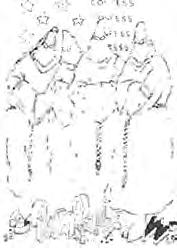
English and Australian Companies Acts have for a long time included special provisions enabling the compulsory interrogation of persons concerned with the running of companies. The new companies legislation which has been enacted as part of the 'Cooperative Companies Securities Scheme' has recast and extended these provisions.
The sections of the Companies (Victoria) Code which relate to the interrogation of persons concerned with corporations can be divided into three areas :
(i) Examinations conducted in court - see s. 541.
(ii) Examinations in the course of a special investigation - see ss. 295 and folloWing.
(iii) The power to seek explanations about company books - see ss. 12 and 13
In addition, the National Companies and Securities Commission is empowered to hold hearings to which it can summons witnesses who can be compelled to answer questions.
This article is concerned only with the third area .
The occasion for seeking an explanation
Investigators attached to the National Companies and Securities Commission and to the various State Companies Offices can attempt to question any person who they feel may be able to provide information about the affairs of a company. However,
like the police, they are obliged to accept a person's refusal to answer their questions or otherwise to cooperate with their investigations. Because company investigators have no special powers of arrest, their opportunity to interrogate a suspect may in practice be more restricted than that of their police counterpart. The inclusion of new powers ancillary to the inspection of company books in the Code has changed this position.
Investigators can obtain the production of a company's books, either as a result of a written direction to produce them pursuant to S.12 given to a person holding them, or as a result of the execution of a search warrant, pursuant to S.13. Once in possession of the books , the Code , by 12(6), for example, enables them to seek explanations from:
(i) the person (not necessarily a company officer) producing the books,
(ii) any other person who was party to the compilation of the book.
The ' books' which can be inspected and on which explanations can be sought are given an all-embracing definition in s. 5 (1). Any document or record produced or held by the company appears capable of being treated as a 'book' The books can only be required to be produced for the purposes setout in s. 12 (1).
(i) For a purpose or function given to the N CS C or its delegates. These are far-ranging See for example s. 540.
(ii) For the purpose of enforcing the provisions of the Code or for investigating any possible criminal activity related to the management of a company's affairs or involving or likely to involve fraud or dishonesty.
In effect, such broadly expressed purposes give the N.CS .C and its authorized delegates a power to inspect and seek explanations of any document if they can relate their interest back to some requirement of the Companies legislation or to some possible breach of company or fraud laws .
The Act is silent on:
(i) how the explanation is to be sought, and (ii) where and how (ie: orally or in writing) it is to be given. Thus it is unclear whether an investigator has a right to insist upon an explanation whereever and whenever he confronts the person from whom he seeks such an explanation. Further, it is not clear as to exactly what matters the requested explanation can be directed to, or how much information is required for an adequate explanation. Section 12 (6) (ii) for instance , refers to an explanation 'as to any matter relating to the compilation of the books or as to any matter to which the books relate' Considerable variation in meaning can be given to this expression. A narrow construction would limit the section to requests about the meaning of items or entries appearing in the company book concerned. A much wider interpretation would require answers to be given to any question that suggests itself to an investigator perusing a company record or document.
One control on the range of questions which an invest igator might attempt to ask under ss 12 (6) and 13 (6) is that questions must be d irected, as already noted, to a person producing the document to the investigator, or to someone who contributed to its compilation. Although the investigator may, to a certain extent, be able to chose his interviewee by requiring a specific person to produce the document, the message of the two sections for important company personnel is to avoid as much participation in the compilation of company documents as possible.
Spring 1982

A person confronted with a request for an explanation is required by s . 14 (1) to answer under the pain of a criminal penalty. Furthermore, the Act expressly removes the privilege against self-incrimination and replaces it with a limited protection: the interviewee's answer to an incriminating question cannot be used in legal proceedings against him. In denying the privilege against self incrimination, section 14 (6) is an even more drastic infringement of the interviewee's civil liberties, because unlike a s 541 examination, the interviewee is not protected by the need to have his answers or explanations given in a court. The lack of a prescribed format for the taking of explanations under ss 12 (6) and 13 (6) raises one obvious problem What procedure is to be adopted when a person seeks the limited protection of s 14 (6)? Who is to decide that his claim is justified?
Section 16 recognises in a rather ingenious way the likely claims to legal professional privilege which a demand for the production of a document, or the request for an explanation about such a document, could give rise to. If a lawyer seeks to rely on the privilege he is obliged to proVide the investigator with the name and address of the person on whose behalf the pr ivilege is claimed. Such informat ion would no doubt assist the investigator in pursuing his inquiries directly with the person concerned with the document , although he may not be able to obtain a copy of the document itself. Once again the question arises as to what is to be done if a claim to privilege is disputed.
The threat of a two-year gaol sentence or a $10 ,000 maximum fine may well mean that a person asked for an explanation and who feels:
(i) that he was not party to the compilation of the document;
(ii) that he cannot give a meaningful explanation ;
(iii) that the requirement for an explanation is sought at an unreasonable or inappropriate place and/or time;
(iv) that he would like to obtain advice (including perhaps legal advice) before answering;
(v) that the information requested exceeds an explanation of a document;
(vi) that he has a claim to the protection under s. 14 (6) which the investigator rejects; or
(vii) that he has a claim to the privilege under s. 16 which the investigator rejects, will be intimidated into giving an explanation which he does not want to give and which he may not be obliged to give (at least at the time it is sought).
The power that has been given to corporate investigators to demand explanations of any company record from people involved with the compilation of such records is a major inroad into the right of the citizen to choose whether to assist police or quasipolice inquiries. To insist that a person must provide information to investigators in a setting that provides none of the protections of a court examination is arguably a dangerous precedent. For example, section 541, in replacing a number of separate and limited provisions on curial examinations under previous Companies Acts has been turned into an all-purpose power of compulsory interrogation. Will 55. 12 (6) and 13 (6) become the model for an allembracing power of interrogation exercisable by investigators without judicial supervision? In the meantime, the absence of judicial supervision of the request for an explanation under ss. 12 and 13, means that there is no obvious person to decide such questions as:
(i) whether a person from whom an explanation is sought, is a party to the compilation of a company book;
(ii) when, where and how the explanation is to be given;
(iii) whether the information sought exceeds an explanation of a company book;
(iv) whether the interviewee has a genuine claim to the limited protection of s. 14 (6);
(v) whether the interviewee has a claim to the limited privilege of s. 16.
This is clearly an unsatisfactory state of affairs.
In keeping with previous Companies Acts, the right to avoid self-incrimination has been modified in s 541 of the Code when a person is examined before a court about the affairs of a company The removal of
the right to silence, and the modification of its more limited corollary, the right against self-incrimination inss.12, 13, 14 and541 raises a question about the status of these rights in the law. The decision to deny the right to silence to an examinee or corporate interviewee suggests that the law does not treat this right as an absolute one (as is perhaps the case in the U.S.A.). The possibility that the right against selfincrimination does not extend to documents would support this view. Although the right to silence obtains support in the policy of the courts which calls for the exclusion of confessional statements which have not been voluntarily made, tangible evidence obtained in breach of that right is not generally excluded.
One explanation of such rules is that the law is more concerned with the reliability of evidence admitted into court than it is in upholding such privileges as the right to remain silent. By protecting an interviewee from legal coercion to provide information, the general right to remain silent when questioned by an investigator or policeman can be seen to buttress the desire for reliable evidence. However when a person is examined before a court, it may be argued that the circumstances of the interrogation will ensure the reliability of the evidence obtained, so that the right to silence for instance can be dispensed with. Because the power to seek explanations about company records is not subject to the direct supervision of a court, the hypothetically higher goal of reliable evidence cannot be used in the same way to explain the inroads made on the right to silence and the right against self-incrimination by ss. 12, 13 and 14. When searching for reasons for the introduction of this legislation, it does not seem possible to escape from a pragmatic conclusion. In particular it would seem that the administration of the law cannot permit the right to silence to become a wall of silence in the path of criminal investigations.





Since the McArthur frauds in the early 1930's the affairs of any corporation have been susceptible to inquisitorial and for reaching investigation. Criminal prosecutions, civil actions and winding up petitions often follow such inquiries Their purpose is to provide evidence for such proceedings as well as an explanation of corporate failure or of the conduct of corporate officers. Inspectors have wide powers A broad class of persons must, if requ ired to do so, produce books and documents, answer an interrogation and render reasonable assistance to the investigator No one is surprised that when an inspector goes fishing, he often fills his creel.
Under the Companies Code, the Commissioner for Corporate Affairs now has like powers. He can demand books and documents and search under warrant if they are not produced. Investigators can require explanations of any document and can examine on oath any person able to prov ide information in relation to a company ' s affairs The N.C.S C. also has broad powers to obtain information in hearings before it.
Since suspected persons or persons who are required to assist in an investigation lose not only their right to remain silent and provide no assistance to the investigators but also the benefit of the common law privilege nemo tenetur seipsum accusare a fundamental issue arises. Does the fisherman have an unfair advantage over his prey?
Spring 1982
The denial of the privilege against self-incrimination is not absolute. Some protection is afforded by provisions to the effect that where the privilege is claimed, evidence compulsorily acquired in denial of that privilege is generally inadmissible in subsequent criminal proceedings. Cold comfort, one might think.
Is the denial of this privilege, once described as "an expression of one of the fundamental decencies in this relation we have developed between government and man" justifiable? Wigmore wrote that: -
"any system of administration which permits the prosecution to trust habitually to compulsory self-disclosure as a source of proof must itself suffer thereby. The inclination develops to rely mainly on such evidence and to be satisfied with an incomplete investigation of the other sources ".
Stephen quotes an Indian Civil Servant who observed that: -
"it is far pleasanter to sit comfortably in the shade rubbing pepper into a poor devil's eyes than to go about in the sun hunting up evidence" .
Blackstone observed:"and his fault was not to be wrung out of himself, rather to be discovered by other means and other men".

The privilege against self ·Incrimination has always controversial. But , is its Justification in the context of traditiona l crime equally apt for corporate crime? Balancing the competing interests of Stafe and citizen in corporate crime investigations requires , is suggested a different approach There are pragmatic reasons.

Crime associa t ed with complex commercial trans· actions Is readily concealabl e in documents in schemes with a facade of respectability. in conduct with an aura of honesty In many cases, an entry In a book of account is itself the criminal act. Evidence of corporate crime Is easily lost ordestroyed. Documents can be ambiguous, transactions can be extraordinarily complex , inferences sImpl y cannot be drawn
Persons who commit corporate crimes are generally better educated than street crimina ls. They know that silence and non-disclosu r e are an effective barrier to probing Investigations
Perhaps It was for these reasons that in the context of bankruptcy legislation "t he English Courts had apparently driven a coach·and -four through the privilege, long before the modern statute of 1883 had expressly nullified it" , whIle tbe pr!vilege has a long pedigree in police investigations , its abrogation In commercial investigations has a pedigree al most as long

Moreover, It Is a misconception to argue that the privi lege can be claimed in circumstances other than testimonial compu lsion King v Mcle Uan (1974) V.R 775. The common law right which civil libertarians jea lously guard is not a right In a positive sense . The reluctance of the common law to sanction interference
by the State in a person ' private or business affairs has e to a right to withold information. It is an Immunity from being coerced into disclosing it.

Was it eve r i ntended that companies have the benefit of this immunity? Do companies hav e civil liberties? Surely an affirmative answer to these questions is an anthropomorphic absurdity It is only in investigation of the affairs of a corporation that the privtl ncorporatIon Is , of course, a privilege granted State If it be necessary to immunity from self·incriminating disclosure supervision and control o f companies , then the State, for the public benefit can reasonably impose such condition in return for th e privileg e of i ncorporation To those who find this an unacceptable imposition, the choice is clear







What needed are adequate safeguards which strike an effective balance of the competlng interests At one level , there is ministerial accountability, media exposure integrity of investigating personnel involved Perhaps the revelations of recent Royal CommiSSions have shaken public faith In these safeguards. another level is j udicial supervision of the Investigative process This can take a number of forms , for example, control over the issue of search warrants , the supervision of curial interro· gation , discretion not to admit relevant but highly prejudicial evidence, and actions for abuse of powers (e.g. R e g, v I.R.C. e xp o Ro ssminister (1980) 2 W LR. 1.). The Courts will be more actively involved in investigations under the Companies than has been their traditional role. The real is not the loss of the privilege against self· incrimination bUl whether the degree of judicial supervision prOVided by the Companies Code is sufficient.



"There are no geniuses in the courtroom, only drudges in the office" Thus spake Theodore I. Koskoff in a presentation entitled " The Art of Persuasion in Advocacy" to some 2500 members of the Association of Trial Lawyers of America and the writer (who went foreign) assembled In Toronto f.or the 1982 ATlA Annual Convention from 16'th23rd July .

Such was the enthusiasm of the drudges for legal education that they settled without demur for standing room only conditions at the Melvin M. Belli Seminar lasting 1 days and Harry M. Philos' thr ee hour presentation on Tort liability.



The theme of the convention was " Lawyers who care". As trial lawyers who appeared for Plaintiffs in Common Law actions and/or the acused in criminal trials the ATlA members demonstrated by their professionalism and dedication to preparation of cases that they did indeed care for their client. The cynic might say that the contingency fee (currently one third of the award of damages) induces a healthy regard for the client's case But my observation was that the easy road was not the preferred route and that responsibility was never shirked . Thus when Philo said , "If an expert fails It is because the lawyer has failed" , there was no murmur of dissent.


Lesson s from past experience and tips for future practice were thus discussed and exchanged with heartening candour and a complete absence of professional jea lousy, highlighting th e fact that the drudges were prepared to work at their own discipline with as much energy as they devoted to the cause of a particular client.
I balked somewhat at John A. Burgess's theory that effective cross-examination was based on a knowledge of anthropology and that the best references for someone who desired to excel at cross-examination were The Naked Ape and Darwin's Theory of Evolution. Despite obvious differences, such as the Immunity of the employer from suit in industrial accident cases in most American States, the similarities of two legal systems where civil jury trials are retained we re striking Bonish mots recalled at random were: -
"liability is the hammer that forges a safer society,"
"The law is not what the Court said the last time, it is what the Court will say the next ti " me.
"Common sense causes injury, it does not prevent it".
"Maximise the effect of a question by putting to your client something you never raised in conference e .g, what sort of a mother was she?"

In the various papers presented at the convention, areas of non-legal expertise were dea lt with in depth For examp le , medical practitioners joined with trial lawyers to speak on such as Toxic Shock Syndrome, the Case with No Objective Damage - Chronic Pain Syndrome, Medico Legal Ramifications of an Autopsy , Medical Causation, Thermography: New He lp in Proving Soft Tissue Injury, Forensic Hypnosis and Negligence in Diagnost ic Pathology [n the Environmental Law Section the topiCS included Private Remedies for Acid Rain Damage, Hazardous Waste Disposal - New Rights and Remedies, How to determine if a Toxic Tort Case is Meritorious and The Spraying of Herbicides as a Toxic Tort,
But in addition, much time was taken dealing with legal technique in such paper s as Exploiting the Lay Witness , New Ideas About Civil Jury Selection, Mishandllng the Medical Expert Witness , Effective Use of the Expert Witness, Trying the Complex Case , Uses of Videotape, Product liability, 'Trial Practice Update , Effective Presentation of General Damages and Handling Courtroom Crises

Spring 1982
"Ask a quadraplegic or a paraplegic what is the single thing they miss the most",
"If a crisis occurs during trial, cross-examine over nothing until the next recess".
"Don't cross-examine at all if there is no goal you want to achieve through the witness or no reasonable prospect of achieving it",
"The trial of a law suit is an exercise in applied psychology. You have to motivate unknown people in a certain direction,"
"Never ask a hypothetical question of an expert on the standard of care",
"When picking the jury ask yourself whether the juror and the Plaintiff would have a drink together in a bar".
"40% of the children born in U,S.A are illegitimate, 66% of the children born in Cook County are illegitimate "
"Is English your native language?"
(The 1983 ATLA Annual Convention will be held in Washington DC from July 15th - 23rd and the midwinter Convention will take place in Honolulu from January 22nd - 28th)
B.H. Stott
"THE LEGAL MYSTIQUE" by Michael Sexton & Lawrence W. Maher
Angus & Robertson 1982 pp 196 $12.95.
Self-examination is almost invariably of some interest, at least to the person or group involved Lawyers seem to be no exception. Lately, however, if one is to judge by the number of texts on the subject, examination of the profession has begun to assume the proportions of an obsession. "The Legal Mystique". which carries the sub-title "The role of Lawyers in Australian Society" is one of the more recent examples
The authors, Michael Sexton and Lawrence Maher are two lawyers, both graduates of the University of Melbourne, with considerable and varied experience. As noted on the dust cover. Sexton is presently an academic at the University of N.S .W. and Maher is in private practice in Melbourne .
A glimpse at the Contents page gives the reader some idea of what to expect. The ten chapter headings include. The Myth of Neutrality, A Private Profession. The Secret Seven, Value Judgments and Pathways to Power. As the first sentence of the Preface states. the book's aim is "to proVide a critical description of the main roles of lawyers in Australian society." Undoubtedly , lawyers and their role, either as individuals or as a profession , are and should be open to criticism. And a book which did this logically. clearly and systematically would indeed be welcome and worthwhile . Regrettably this is not such a book.
The book attempts to determine and critically assess what lawyers are and do in Australia by addressing itself at the outset. to the question. what ought they be and do. This requires an examination of various
views that exist on the subject. including. of course. those. of the authors . The reader might then expect an investigation of what lawyers in Australia. in fact are and do. followed by a discussion and evaluation of their performance and role in society To say that the book is intended for an audience outside of the legal profession does not excuse the authors from the need for such analysis but rather makes it more important that the clearest and fullest explanations should be given. Unfortunately. the book in this respect is long on assertions and assumptions and short on analysis and argument.

The authors' central theme is that the law is Widely seen both within and without the profession as a set of immutable principles that have always and will always exist and that lawyers reveal these principles with remoteness and neutrality. transcending any question of personal values or interest. According to the authors "The most cursory glance at the Australian legal system demonstrates that this idea of the law is a myth" . Such an assertion may be true but is hardly self-evident.
The authors show that judges handle social and economic questions that affect distribution of power and resources in society. that they as a group are unrepresentative of the community. and that many of their decisions are not unanimous This is hardly a logical demonstration that judges not perform their role neutrally or that they do not seek to proceed by the application of general principles Nor does it take the argument much further to show that judges must. on occasions. make essentially subjective decisions. such as defining the word "obscene" The repeating of these or similar assertions eventually becomes tedious .


The assertion that when a n umber of lawyers opposed retrospective legislation designed to counter a taxevasion scheme involving an estimated $941 million as being a threat to the Rule of Law, it was quite clear that more than abstract legal principles were at stake, is obviously true But it is also trite to the point of worthlessness. Hardly proof, as the reader presumably is intended to infer, that the lawyers ' view of spective legislation is insincere and , accordingly , false .
One waits in vain for the promised proofs of the authors ' bold assertions. Ultimately one is left with the all too familiar allegation that the law or , more precisely , lawyers are defenders of the status quo and , in particular, of the ruling class of which they are almost by definition members, or at least willing servants.
The book, however, does have value and interest. Paradoxically, this is for the legal profession itself, particularly that of Victoria. Lawyers will find information and entertainment in reading the numerous anecdotes, incidents and comments by or concerning fellow practitioners many of whom will be known personally. Furthermore , the authors canvas most of the fields in which lawyers operate, including the Bar, private firms both large and small corporations, the government, politics and so forth Many of the authors' criticisms of lawyers in these fields are well directed and interesting One gets an impression that the authors are not unduly empathetic with the Bar (it is significant perhaps that neither has apparently practised at the Bar) They seem more at home discussing the role of lawyers in government, corporations , or with the large corporate-orientated firms, which roles the authors feel have much in common Overall , the final impression of the book can best be summed up by the picture on its cover. It shows a wig, a Bible , and a gavel. As far as this critic is aware , the gavel is not used in Australia If this is so, then rather than dispelling or correcting myths , the authors are helping propagate and perpetuate them.
Two members of the Victorian Bar (Vickery and Gifford Q ,C,) are among the 60 speakers presenting papers at the first ever international seminar on Cost-Benefit of Environmental and Planning Controls.
Speakers include Lord Mackay of Classfern (the Lord Advocate of Scotland and formerly Dean of the Faculty of Advocates), Lord Nathan (senior partner of a leading firm of London solicitors and a member of the English Royal Commission on Environmental Pollution and of the House of Lords Select Committee on the European Communities SubcommitteeG (Environment)), Sir Wilfred Burns (Chief Planner of the English Department of the Environment), judges from Australia and New Zealand, a Deputy Judge from Holland and other speakers from Australia, Thailand, Hong Kong, England, New Zealand, India, South Africa, U.S .A., Canada, Japan, Belgium , Germany and Malaysia
Several of the topics being discussed at this seminar have never previously been the subject of international seminars or conferences. For example, Cost-Benefit Analysis, Economic Impact Analysis and Economic Incentives.
Accommodation is at the Hyatt Regency Hotel - an hotel of international standard
The all-inclusive price (airfare, accommodation, meals , registration, seminar papers and harbour cruise) is $1,575 for I.B.A. Committee F members , other I.B.A. members $1,625 and all others $1 ,675. A very special price for accompany ing spouses (airfare , accommodation, harbour cruise , 2 tours and all meals except two lunches) is $870.
Further information and registration forms are available from Gifford Q.c. (room 501. PAX 246) or his secretary, Miss Brenda Bacon (room 502, PAX 244)
Dear Sirs,
The Summer 1981 issue of the Victorian Bar News containing a comment on plea bargaining by Daryl Dawson Q c., the Victorian Solicitor General, has recently reached these distant Canadian shores. The comment includes references to the Australian Law Reform Commission's (AL.R.C.) report on Sentencing of Federal Offenders (AL.R.C.15) which suggests that the Commission's views on plea bargaining were based on inadequate information, particularly in regard to Victorian plea bargaining practice. As such , the comment deserves a response.
Mr. Dawson writes that" had the Commission sought its information in Victoria from those acquainted with the practice here it may have found the position (in regard to plea bargaining) to be less obscure than it apparently did". The principal information which was available to the Commission about the Victorian practice came, in fact, from a series of interviews with a number of members of the Victorian bar nominated by the Law Council of Australia . As the Commission noted in AL.R.C. 15:
"The interviews were taped and a transcript prepared. At the request of participants , individual members of the bar are not identified. They represented a cross-section of practising barristers working in the criminal law area and included several very senior members of the bar. The Commission believes that the views expressed are not atypical and are , so far as possible, not unrepresentative of the general consensus of views on this topic." (A.L.R.c. 15:73)
The description given the Commission by these members of the Victorian bar of plea bargaining practice in that State prior to Marshall's Case seems entirely consistent with the account given of this practice by Mr. Dawson
Mr. Dawson indicates that the Commission did not have available to it the views of a large number of Victorian judges about plea bargaining. This information gap was not, however, of the Commission's making for as Mr. Dawson points out most Victorian judges, unlike their counterparts in all other parts of the nation, declined to respond to the AL.R.C.'s National Survey of Judges and Magistrates. While drawing attention, somewhat gratuitously , to this reticence on the part of Victorian judges, Mr. Dawson also suggests that the obtaining of these judicial views would have been of little consequence since " judges would have, at the most, only incidental knowledge of the Crown practice in this area because, as was pointed out in Marshall's Case, it is not their concern".
Mr. Dawson appears to be critical of the quality of information obtained from two further sources consulted by the Commission about plea bargaining practice, namely, Commonwealth prosecutors and offenders. He observes that "the only prosecutors whose views were sought were, it seems , Commonwealth prosecutors and the Commonwealth has a lim ited involvement in serious crime ". This observation is less than complimentary to the staff of the Commonwealth Solicitor General who annually prosecute a significant number of offences against the laws of the Commonwealth throughout the nation and whose views on plea bargaining, as well as other topics associated with the punishment of federal offenders, were directly relevant to the AL.R.C.'s speCific terms of reference.
As for obtaining information from offenders, although their views on plea bargaining may , in Mr Dawson's words, "tend to be unreliable", they remain members of the group most Vitally affected by this practice in
Victorian Bar News
Victoria and elsewhere in Australia The Commission's National Survey of Offenders showed that about 15 % of respondents received some adv ice about their plea from police and lawyers. The nature of the advice wh ich was said to have been received, although not subject to verification, suggested that persons accused of crime were subject, on occasions, to illeg itimate pressures from a variety of sources to plead guilty.
To conclude on a more positive note , it is refreshing that after remaining for many years a practice which has s carcely been mentioned in the Australian legal literature , plea bargaining is now emerging as a topic worthy of serious attention by members of the profess ion as well as by law reform commiss ions and academ ics. But we still need to know much more about this controversial practice befor e reaching firm conclusions about its merits Mr Dawson already gives his cautious approval to the practice in Victoria. Subject to "careful supervision", he states, "it is a desirable and useful practice, saving , as it does, unnecessary public expense and inconvenience and aiding in the efficient disposal of cases". Mr Dawson may well be correct in his assumption that the plea bargaining benefits the public although it may still be an expedient which has severe costs for persons accused of crime. For this reason the practice should not only be the subject of "careful supervision " by the Crown , as it appears to be in Victoria , but also by the courts. In the interests of justice any agreements made between the prosecution and defence should not remain secret deals struck betw e en them. Plea bargains should be recorded in open court, thereby allOWing the possibility of subsequent review by a judicial officer. For as the A.LR.C. Commented "secrecy in the administration of criminal justice engenders cynicism which may be justified on the part of the accused, his family and fr iends, and suspicion and doubt in society as a whole ".
Duncan Chappell , Professor, Simon Fraser University. Former Commissioner in Charge of the A.LR.C's Reference on Sentencing.
Dear Sir,
Having been recently appointed as Registrar of Criminal Appeals I felt I should write to you seeking the Association's views relating to Criminal Appeals to the Full Court
In particular, I would be pleased to know of any problems Counsel encounter in:-
(a) The preparation of and the settling of grounds of app e al or applications for leave to appeal.
(b) Applications for extension of time
(c) Applications to amend grounds
(d) The listing of appeals or applications for hearing by the Full Court.
(e) The question of communications.
(n Any other problems encountered.
In what way any such problems can be remedied and any other suggestions that your Association can offer that will assist the Full Court, the appellants or applicants , legal practitioners , the Legal Aid Commission and all other persons who may be involved , would be welcome .
I would be happy to meet with you and/ or members of your Ass o ciation should you so desire, or alternatively receive any written submissions your Associat ion might care to make
I await your a dVice .
Yours faithfully
J.B. Gaffney Registrar of Criminal Appeals
Submissions may be forwarded to J.H. Phillips Q.c.

The High Court, Pappas c.J., Smith , J. and Mrs Justice Greenbaum delivered the following written judgment.
The abovenamed Applicant was presented in the County Court at Melbourne before Judge and jury of five on one count of advising a potential witness not to give evidence before the Grimes Commission. He pleaded not guilty. He gave evidence on oath but was apparently not able to satisfy the jury of his innocence He was convicted by a 3-2 majority. He seeks leave to appeal to this court.
The Applicant was until his conviction a barrister of many years standing. He is, as is well known, earlier in call than any of us on this bench. Before we examine the grounds of appeal, it is appropriate to examine the circumstances surrounding the laying of this charge against Mr. Cassandra, and the history of the Grimes Commission
Francis Xavier Grimes is one of His Majesty's Counsel for the State of Victoria. Some fifty years ago he was apPointed a Royal Commissioner to inquire into certain alleged criminal practices with respect to the tea money of the Union
From these humble, one might say extremely limited, terms of reference , Mr. Grimes has conducted a wide ranging and thorough-going examination of nearly every facet of Australian society. His commission, known commonly as "the Grimes Commission" has, by a combination of subtle reasoning, and lobbying of legislators extended its ambit to a remarkable degree Commencing with the tea money of the Union, this Commission extended its inquiries to all tea money of all trade
unions. Not content with that , it extended itself to all financial affairs relating to foodstuffs of all persons who were or might reasonably be expected to be trade unionists. An inquiry into foodstuffs led, inevitably, to an inquiry into other essential industries such as textiles, automotive parts, income tax , blowup rubber dolls , health studios , and political parties
There now appears to be little which has not or indeed cannot be investigated by Mr. Grimes It was submitted on the applicant's behalf that the witness has no connection whatsoever with any matter or thing properly the subject of the Grimes Commission and ought not be required to answer any questions put to him by that Commission
It is common ground between the parties that the witness is a man with no known criminal record, who has no known criminal connections, and against whom nothing is alleged . It is conceded by Mr. Grimes that he proposes to embark upon a fishing expedition designed to elicit from the witness any criminal behaviour in his background which may have so far in his life remained undetected. When asked by the Bench what sort of offences the Commission had in mind, Mr. Grimes made a report which stated that the terms of the Act under which the Commission was established precluded him from disclosing such information. We accept. however, that Mr _ Grimes would not be proposing to expend public money upon an enquiry that has no relevance to the highest interests of the Commonwealth
The Applicant relied upon an old decision of this Court: Hammond v. Cth. of Australia (1982) 173 C.LR. 47 The High Court held in that case that the so-called "right" not to incriminate oneself may not apply to Royal Commissions
Victorian Bar News
At his trial the Applicant freely conceded that he had advised the witness not to give evidence to the Commission He, of course, has no answer to the Respondanfs contention that he is prima facie in breach of the Royal Commissions (Offences) Act 1989 which makes the giving of such advice an offence His defence was that the policy of that legislation ought give way to a higher public interest.
The Applicant's argument needs only to be recited for its error to become apparent. He claimed that he was a member of a free and independent Bar which stood between the might of the State and its humblest citizen; that he and like-minded men were the bulwark of liberty. He argued that the Court ought not convict him of an offence arising out of his performance of so high a calling The Crown in rebuttal produced the microfiche of the minutes of the Victorian Bar going back as far as 1980 when the Grimes Commission was established _ Those minutes show a certain pattern: 1980-1982 the Bar was concerned with accommodation, 1983-1995 was devoted to the arguments on mode of dress in courts , 1995-2009 was accommodation again , 20102017 clerking , 2017 to the present , computerised reports There is no need to go through it all. There is only one reference to the Grimes Commission. In 1983 shortly before the passing of the Grimes Commission Act, an extraordinary general meeting of the Bar was called. That meeting was at this instance of Cassandra for the purpose of venting his spleen against the intended legislation. The motion he put was "that this Bar deplores in the strongest terms the threat to liberty embodied in the Grimes Commission Bill." The motion failed for lack of a seconder.
Thus we do not have to address ourselves to the argument that the superior public interest is a defence to this charge. Simply, the Applicant failed to satisfy the jury of the factual basis of any such defence, and it is not therefore necessary for us to deal with it.
The application therefore fails. The sentence that the Applicant's taxation returns for the last 10 years be reassessed and thereupon doubled, is affirmed
Gunst.
Spring 1982
cFfJ or: ;/





'"


On a block application by the Police for adjournment of all .05 cases due to a pending High Court deciSion, the following occured :
Brendan Murphy : "I am concerned about the question of bail. We have had long discussions in relation to the adjournment of matters before, Your Worship."
Wallace. S.M.: "Yes, but I'm not sitting in my own region today "
Cor. Wallace S.M., Prahran Magistrates Court 11 May, 1982
After an explanation by Counsel that the appellant needed an interpreter, and after the swearing in of the interpreter, the following exchange occurred: TIpstaff to interpreter: "Repeat after me".
Interpreter to Appellant : "Repeat after me".
Appellant holding the Bible aloft: "Repeat after me",
Cor. Judge Mullaly, 26 July 1982.
A guilty plea had been entered for two well scrubbed Defendants on charges of theft. The thefts occured after a night out to celebrate a friend's acceptance into the police force.
Mr Plummer (Duty SoliCitor) : "These young men share a house, after moving to Melbourne from the country As single men they do not have the stability that marriage proVides."
Dugan SM: "Surely Mr . Plummer you are not suggesting that I sentence them to marriage."
Melbourne Magistrates Court 20 September 1982
GOLDBERG Q.c.: "We are really entitled to our costs, Your Honour, but we are quite prepared that the order should be 'Costs in the cause'."
ANDERSON J. : "When I hear something like that , Mr Goldberg, I think of the saying, 'Beware of the Greeks when they come bearing gifts'."
GOLDBERG Q.C.: "That appellation does not apply to me, Your Honour, but we felt we would save you from the task of applying the wisdom of Solomon."
Practice Court 5 August 1982
From the Lawlist COUNTY COURT.
Chambers 11 am. : Judy Mullaly
"The Sun"
15 Sept. 1982
Imagine the scene at an international airport recently . A message came over the loudspeakers in English with a Spanish accent. Half way through, the announcer broke into laughter.
" Calling Dr. Pannam on Pan·Am from Panama " Every so often after that, he would repeat it just for the fun he got out of it.
The most recent South Australian case on dog control legislation is Hancock v. Catt 28 S.A.S R. 457.
Sgt. Hanna, Prosecuting; to an unrepresented Defendant accused of burglary on Salvation Anny premises and having been apparently caught in the act: " You well know what you have done : the reason you hid was because you were trying to hide."
Cor. Gillman, S.M. Melbourne Magistrates Court 6 July 1982
Witness was asked his name, address and occupation. "Thomas Hafey, Wells Road Beaumaris Printer and ex·football coach"
R. v Mooney September 1982
Cor. Judge Hogg.
It was noticed that Peter Hudson came out of retirement to challenge Mark Jackson of Melbourne in a "goal shooting competition" in Tasmania. Age is of little significance in assessing a footballer' s capabilities of "steering the pigskin through the uprights", John Jordan, celebrating his 33rd birthday on the 10thJuly 1982 kicked 12 goals for North Melboume Old Boys in the "A" grade Amateur Match against AJAX. His first opponent for the day was Julian Weiner - the test cricketer. This score constituted a record and the team subsequently won the flag .
Holsam , part owned by Hicks, got up in the last stride towin the p restigious Moonee Valley Stakes on 25th September 1982 This race which has been a good gUide to the Caulfield Guineas and the VRC Derby, has already enhanced the value of the colt to a marked degree. Hicks will return fom holidays in a few weeks time
The annual Bar and Bench versus the Services held at Huntingdale Golf Club on 30th August 1982 resulted in an even division of the spoils . The Bruche Cup was won by the Bar and Bench but Judge Harris was required to hand over the MacFarlan Cup to Group Captain Holmes Cashmore , who organises the events (and the handicaps!) won the ind ividual trophy
Pau l "Galloping" Guest has fulfilled his aim in cracking the 3 hours 30 minute barrier, for the Marathon run over a distance of 26 miles and 3 8 5 yards This was achieved at Dromana a month or so ago. Notwithstanding a functional overlay from the Family Law Court he broke his target by 9 minutes


Charge should be made prior to the time when it is
